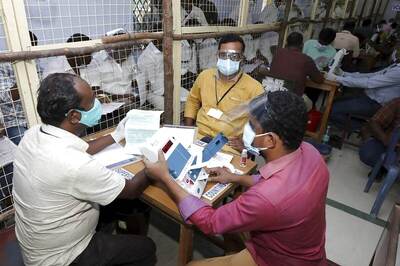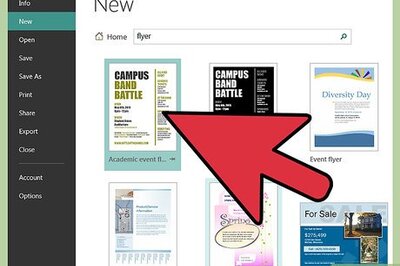
views
A new pandemic is under construction in silence now. These warning words came from Dr Anuj Sharma, WHO’s country officer for India, on the issue of antimicrobial resistance. Experts at a health conference in Hyderabad called for states to have a comprehensive plan to combat antimicrobial resistance (AMR) after the pandemic, with the increased misuse of antibiotics.
Warning of an impending viral era, Kerala Health Minister also said on Monday that the state has started an Anti-Microbial Resistance campaign, aiming to be completely AMR-literate state by 2023.
But what is antimicrobial resistance and how much of a threat is it to you? News18 explains.
Resistant Germs
In simple terms, antimicrobial resistance or AMR is the ability of bacteria and other germs to resist the effect of antibiotics they were once sensitive to.
“AMR occurs when bacteria, viruses, fungi and parasites change over time and no longer respond to medicines making infections harder to treat and increasing the risk of disease spread, severe illness and death. As a result, the medicines become ineffective and infections persist in the body, increasing the risk of spread to others,” the World Health Organisation has explained. The international health body has also warned of an increased incidence of AMR amid the Covid-19 age.
How Does AMR Occur?
Microbes are very small living organisms, like bacteria. Most microbes are harmless and even helpful to humans, but some can cause infections and disease. Drugs used to treat these infections are called antimicrobials. The most commonly known antimicrobial is antibiotics, which kill or stop the growth of bacteria, US health body CDC explains.
However, a couple of ill-advised practices lead to the these germs becoming resistant to the drugs. These are:
• When human and animal health professionals over prescribe antibiotics
• When people don’t take antibiotics as directed
• Due to poor hygiene and a lack of infection prevention and control e.g. not washing hands properly
• Due to people travelling around the world, spreading resistant bacteria.
How Does Covid-19 Peak Into, and Worsen the Picture?
According to experts, the situation has worsened amid the Covid-19 with the misuse of antibiotics.
Dr Suranjit Chatterjee, senior consultant, Internal Medicine, Indraprastha Apollo Hospitals told the Indian Express that the situation has worsened amid Covid “with doctors attributing the increased risk of antibiotic resistance to unscrupulous use of “high-end broad spectrum” antibiotics.”
“During Covid, serious patients developed secondary bacterial infections for which high-end antibiotics were used sometimes for a prolonged period leading to the development of resistance,” he said.
Dr Mahesh M Lakhe, consultant at the Columbia Asia Hospital, Pune told the Indian Express that the use of antibiotics as a substitute to hospital infection prevention and control practices may have been “one of the biggest mistakes during this pandemic.”
AMR is a Threat to Serious Covid Patients Too
The US Centers for Disease Control also paints a worrying picture for serious Covid-19 patients, as the health body in its assessment on Covid and AMR links shed light on the increased possibility of patients suffering from coronavirus in healthcare settings becoming infected with a secondary bacterial or fungal infection.
“Data shows that patients with COVID-19 may be more susceptible to getting a secondary infection while hospitalized. Infections that occur while in a hospital are more likely to be caused by resistant germs,” the CDC says.
What Can be Done to Prevent the Risk of AMR Amid Covid-19?
According to Dr Anuj Sharma, the general public should follow ‘3Ws and 2Vs’ for safer living. “Wear masks, watch distance and wash hands, and the 2Vs would be to follow vaccination and ventilation,” he said, the New Indian Express reported.
Dr Lakhe says that antimicrobial stewardship and avoiding self-medication is the first step to prevent AMR.
People should only rely on antibiotics prescribed by a doctor, he said.
Experts also recommend that antibiotics should be used judiciously after identifying the actual cause of infection.
“Instead of broad-spectrum antibiotics, directed, targeted doses should be used against specific pathogens. And when the infection is healed, the antibiotic should be quickly deescalated or reduced to safeguard antibiotics,” Dr Praveen Gupta, director, Neurology, Fortis Memorial Research Institute, Gurugram told the Indian Express.
Experts also call for people to try and follow a healthy lifestyle to prevent infections and thereby the spread of resistant bacteria.
Veena George told the Indian Express that amid the measures being taken to prevent AMR in the state, special orders had been given medical shops not to give antibiotics without medical prescription.
Read all the Latest India News here




















Comments
0 comment